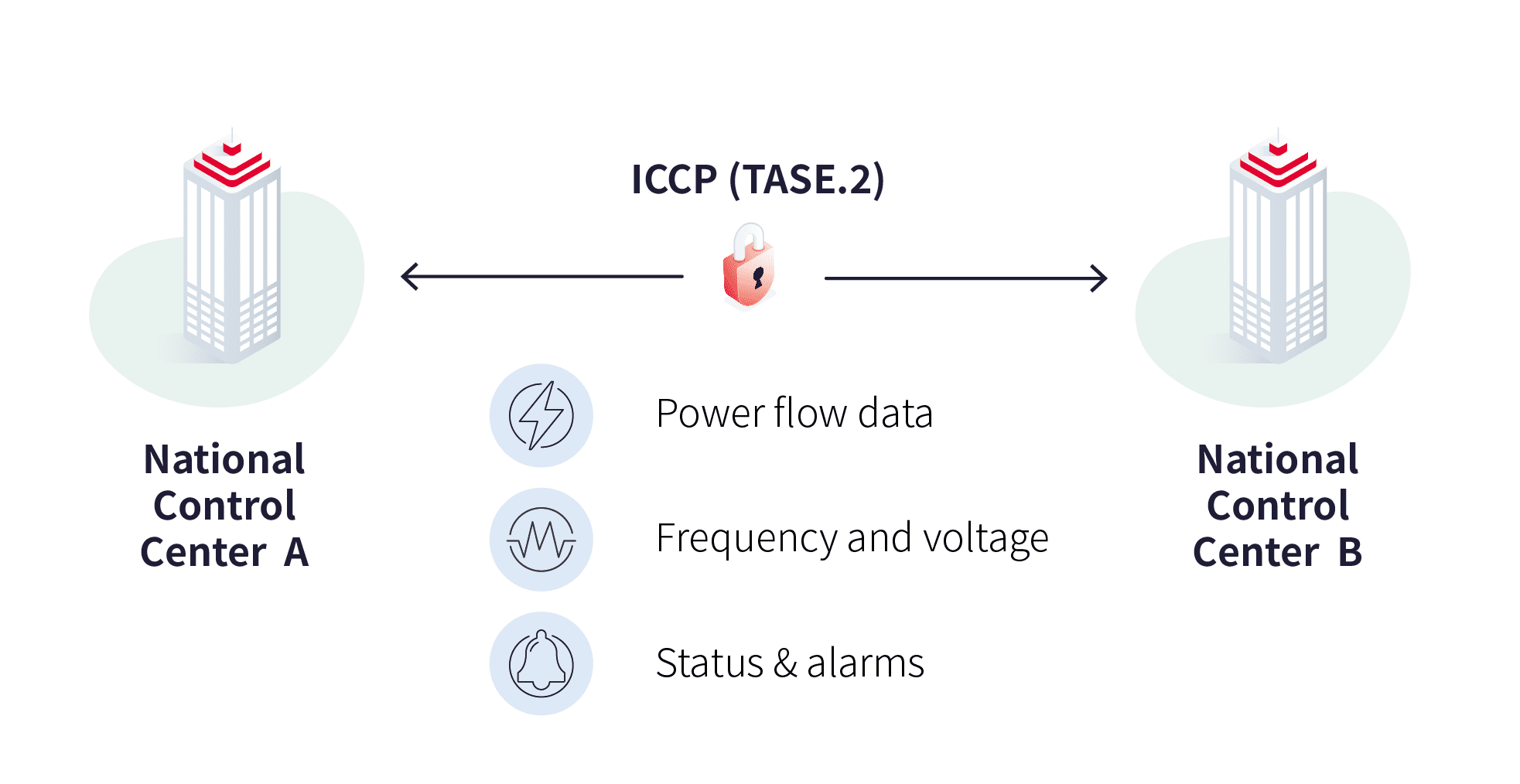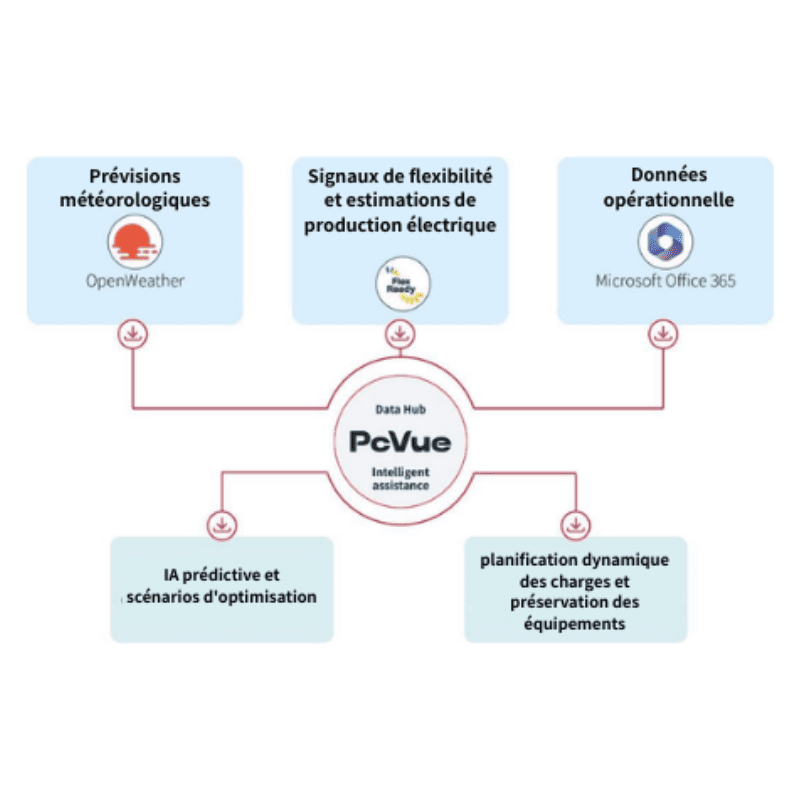
In today’s energy sector, reliable communication between control centers is essential to maintain grid stability, enable cross-border energy exchange, and ensure regulatory compliance. The Inter-Control Center Communications Protocol (ICCP)—also known as IEC 60870-6 TASE.2—is the standard that makes this possible. In this article, we’ll explain what ICCP is, why it’s so critical, and how PcVue integrates ICCP directly to reduce complexity, cost, and risk for utilities and system integrators.
What is ICCP?
ICCP, short for Inter-Control Center Communications Protocol, is part of the IEC 60870-6 standard and provides a framework for data exchange between power grid control centers. Internationally, it is known as TASE.2 (Telecontrol Application Service Element 2).
In simple terms, ICCP allows different operators—often across companies or even countries—to share grid information securely and in real time.

Why ICCP is Essential
Power grids are no longer isolated systems. With the rise of deregulated energy markets, cross-border electricity flows, and renewable integration, the need for standardized communication between control centers has never been greater.
ICCP supports:
- Real-time monitoring of grid frequency, voltage, and power flows
- Data exchange for grid operations, including status values and measurements
- Balancing authority coordination, ensuring supply and demand match across regions
Who Uses ICCP?
ICCP is widely adopted in the power sector by:
- Transmission System Operators (TSOs) to coordinate operations across regions or countries.
- Generation companies, including large-scale wind and solar farms, which need to share real-time production and status with control centers.
- Distribution and substation projects, where utilities provide operational visibility to national or regional coordinators.
- National regulators to ensure secure and transparent energy exchanges.

ICCP in PcVue: A Smarter, Integrated Approach
Direct ICCP Integration in PcVue
Traditionally, SCADA systems rely on a third-party ICCP gateway to exchange data with remote control centers. But every extra component adds:
- Cost (licenses, maintenance contracts, server hardware)
- Complexity (more configuration steps, vendor dependencies)
- Risk (more potential points of failure in critical communication)
PcVue simplifies this by offering native ICCP integration. Your SCADA can communicate directly with external coordinators or operators, without any external gateway. The result is a leaner, more reliable architecture that reduces costs and increases system resilience.
This direct integration is especially valuable for projects where SCADA systems must:
- Share real-time measurements with a national transmission operator
- Report status and alarms from substations and renewable plants
- Provide operational visibility to regional or neighboring utilities
By removing unnecessary layers, PcVue helps you design and deploy ICCP-enabled projects faster, with fewer risks along the way.
Secure by Design: Ready for Today and Tomorrow
More countries are requiring by law that power utilities use secure communication channels for inter-control center data exchange. Cybersecurity is now a baseline requirement, not an optional feature.
PcVue’s ICCP implementation already includes a secure communication layer with encryption and authentication. This ensures:
- Compliance with evolving national and international regulations
- Protection against data interception and cyberattacks
- Future-proofing your projects as requirements tighten worldwide
💡 This makes PcVue not just a practical choice today, but also a strategic choice for the years ahead.
One Platform, Multiple Protocols
ICCP is only one piece of communications puzzle. PcVue also provides native support for key power protocols such as:
- – IEC 60870-5-104 Outstation
- – IEC 60870-5-101/104 Client
- – DNP3
- – IEC 61850 MMS Client DNV KEMA certified
- – IEC 61400-25
- This all-in-one approach allows utilities and integrators to design systems that are interoperable across the entire energy value chain—from substations and renewable plants to control centers and emerging applications like EV infrastructure, thanks to PcVue’s drivers for power automation and Smart Grid interoperability.
Learn More: PcVue Training on ICCP
While this article covers the big picture, configuring ICCP in a real project requires detailed knowledge. PcVue offers a dedicated training course on ICCP integration, where participants learn:
- How to model and configure ICCP data points
- Best practices for secure communication
- Tips for optimizing interoperability with remote partners
This way, engineers and integrators can gain the skills to confidently deliver ICCP-enabled projects with PcVue.

ICCP (TASE.2) is a cornerstone protocol that enables secure, real-time communication between power grid control centers. For utilities and system integrators, choosing the right implementation can mean the difference between a complex, costly setup and a streamlined, future-ready solution.
With PcVue’s built-in ICCP, you eliminate the need for external gateways, simplify your architecture, and ensure compliance with modern cybersecurity requirements—all while reducing costs and deployment times. Combined with PcVue’s broad native protocol support, you gain a single, unified platform for today’s and tomorrow’s energy challenges, including renewables like wind and solar.
Ready to take the next step? Discover PcVue’s ICCP-ready SCADA solutions and explore our ICCP training course to gain hands-on expertise for your next project.
Interested in mastering ICCP with PcVue?
- 👉 Or contact us to discuss your next ICCP-enabled project

